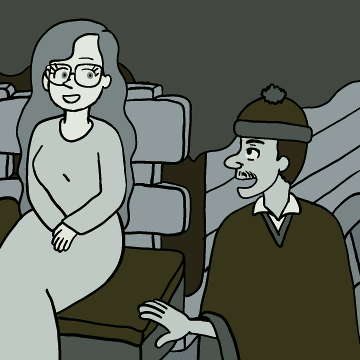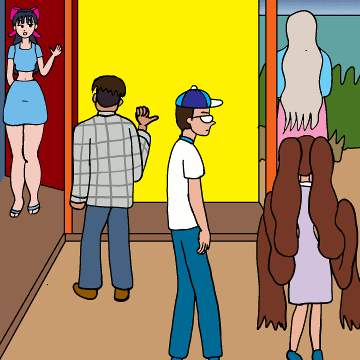#415: Luis Emilio Gómez Rodríguez - 2016-11-01

“ It happened in 1914, when I graduated from the Normal School of Chillán. To celebrate it, I took a vacation trip with my father to Penco, at the house of some relatives.
“ Luis was raised in a family of fisherfolk, and owned a boat, which we used to take a trip through the coast. I remember that I asked him about everything, though I don't remember the details. That was the first time that I was on board at any vessel, and I was fascinated by what I was living and the things Luis was telling me. I was 20 years old, but I was quite innocent: as I spent my life studying, I didn't experience much about life.
“ According to the rules of the time, I had to return to Chillán to do classes at a given school, and I was to stay there for a minimum of six years before I could go look for a job elsewhere. Because of that, I didn't want to look for a fiancé yet, though I was at risk of becoming a spinster. It was difficult to get married back then.
“ Later, in 1916. To me, it was just another day, after being done with my daily chores. I saw him on the way back home, driving a cart that was full of groceries. He invited me to the cart, and we talked for a while. I told him about my job as a teacher, and he told me about his life as a fisherman. He told me that he worked as an operator at a factory in Concepción and that he could withstand the work schedule. Also, they worked from Monday to Sunday, which was against the Ten Commandments, and hence unacceptable to him. Being a fisherman, on the other hand, he could decide when to go out or not, though it all depended on how good was the catch.
“ Fishing in Penco used to be better than today, and a skilled fisherman could catch enough fish to be able to save money for bad times. With his savings, he decided to come to Chillán and look for me, because he wanted to marry me. I told him that I wanted us to get to know each other better, to spend some time together before getting married. Also, because I was to continue doing classes at the Chillán school until 1920.
“ Then he decided to move to Chillán. As he didn't have enough money to buy himself a house, and because there was no available job for someone like him, my dad decided to let him in our house and to pay him a salary for various menial jobs, cleaning and gardening.
“ We got married in 1918. In order to celebrate, we went for a trip to Chiloé, and there I got pregnant. Cristián was born at the end of that year, later came Andrea in 1921 and José in 1924. José died young, in 1948, from tuberculosis. Cristián was killed by a workmate in 1973, after the coup d'etat, likely for political reasons. Andrea no longer lives at her old house in San Carlos, so I don't know if she's still alive.
“ My father died in 1927, and he inherited me this house, and several plots of lands that he had leased to other people. Later, because of the economic crisis, our tenants left. We didn't want to sell, because we knew that inflation would soon make our money worthless, and because nobody would want to pay what those lands were actually worth.
“ Later came the 1939 earthquake, which our house withstood with little damage, more so consiering the disaster that surrounded us. As during the last ten years we didn't have much luck trying to find tenants or buyers, we decided to transfer those lands to the State. Also, we made generous contributions to the people affected by the earthquake. Those were quite difficult years, and we had to work hard to get through it all.

“ Cristián moved to Santiago in 1940, and Andrea got married in 1943. José never found a girlfriend, despite being diligent, because he was quite sickly. We expected to see him die sooner or later at our house, though we thought he would die earlier.
María made many pauses during her account, but after saying those last words, she closed her eyes and became dejected. There was something that overcame her, and that she didn't want to disclose. Finally, she stood up and walked outside for some air, without saying anything else.
The kids looked at each other, confused, without thinking of asking María about what bothered her. That was when Rosa, dressed in her bathsuit because of the heat, called them to the dinning room for lunch.
